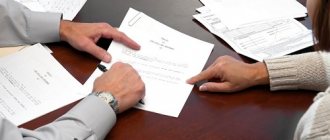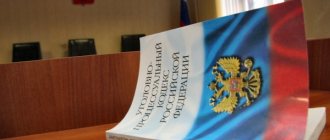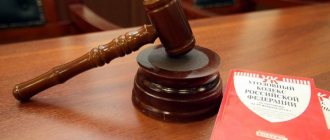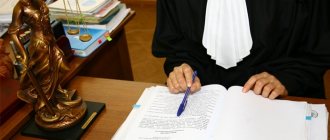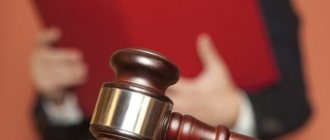Forensic expert's memo
Home / Memo for a forensic expert
P A M Y T K A
for forensic experts and judges
1. What are the requirements for a forensic expert (who can be a forensic expert).
1.1. All procedural codes indicate only one basis (requirement) for appointing a person as a forensic expert - the presence of special knowledge (Article 57 of the Code of Criminal Procedure of the Russian Federation, Article 85 of the Code of Civil Procedure of the Russian Federation, Article 55 of the Arbitration Procedure Code of the Russian Federation).
At the same time, procedural codes require that in his conclusion a forensic expert report on his education, specialty, work experience, availability of an academic degree and (or) academic title (Article 204 of the Code of Criminal Procedure of the Russian Federation, Article 86 of the Arbitration Procedure Code of the Russian Federation). The requirement for higher education for state forensic experts is contained in the Federal Law “On State Forensic Expert Activities in the Russian Federation” (No. 73-FZ dated May 31, 2001). This data helps the court (investigator, inquiry officer) in deciding the issue of the expert’s competence.
In addition, the competence of a forensic expert is confirmed in the voluntary certification systems of the non-profit partnership “CHAMBER OF FORENSIC EXPERTS” (NP “SUDEX”), which is currently the only organization that certifies non-state forensic experts and non-state forensic laboratories in the Russian Federation. Both voluntary certification systems are registered in the unified register of registered voluntary certification systems of the Federal Agency for Technical Regulation and Metrology (Gosstandart of Russia): “System of voluntary certification of non-state forensic experts”, registration certificate No. ROSS.RU.I597.04.NYA00, dated 16.10. 2009; “System of voluntary certification of non-state forensic laboratories”, registration certificate No. ROSS.RU.I643.04.SEL0, dated April 22, 2010.
Within the framework of these voluntary certification systems, Registers are maintained to register participants in the systems, issued, suspended and canceled certificates of forensic experts and forensic laboratories.
Registers of certified forensic experts and forensic laboratories are posted on the website of NP "SUDEX" - www . sudex.ru and are equipped with a search system that allows you to find a forensic expert or forensic laboratory in the required specialty in any region of the Russian Federation, which greatly facilitates the search for the necessary specialist to perform a forensic examination.
The training programs for forensic experts, which define the requirements for them in the above certification systems, have been approved by the Ministry of Justice of Russia.
1.2. Federal Law “On State Forensic Expert Activities in the Russian Federation” (N 73-FZ dated May 31, 2001), Article 41 extends its effect to forensic expert activities of persons who are not state forensic experts, and states: “In accordance with According to the norms of procedural legislation of the Russian Federation, forensic examination can be carried out outside state forensic institutions by persons with special knowledge in the field of science, technology, art or craft, but who are not state forensic experts. The forensic expert activities of the persons specified in part one of this article are subject to Articles 2, 4, 6 - 8, 16 and 17, part two of Article 18, Articles 24 and 25 of this Federal Law.”
2. What demands placed on forensic experts are unlawful?.
2.1. Requirements for an expert to provide a license to conduct forensic examinations and (or) information (document) about his accreditation are illegal and unfeasible.
Licensing of forensic activities is not provided for by Federal legislation (Federal Law dated 08.08.2001 N 128-FZ (as amended on 07/27/2010) “On licensing of certain types of activities”; Resolution of the Government of the Russian Federation dated 01/26/2006 N 45 (as amended on 20.08. 2010) “On the organization of licensing of certain types of activities”)
Currently, there is no accreditation of forensic experts in the Russian Federation.
2.2. If a forensic appraisal examination, a forensic construction and technical examination or other types of forensic examinations are performed (appointed) by specialists of self-regulatory organizations (SROs), the requirement for the expert to provide information about his membership in the SRO is not provided for by law . Forensic examination is carried out only according to the norms of procedural codes. As for the expert’s competence, it should be established on its merits, and not on formal grounds.
2.3. Requirements for specialized education of a forensic expert are unlawful. The law (Article 204 of the Code of Criminal Procedure of the Russian Federation, Article 86 of the Arbitration Procedure Code of the Russian Federation) requires that education be indicated without specifying: higher education, specialized secondary education, specialized education, etc.
The Code of Civil Procedure of the Russian Federation says nothing at all about the education of an expert.
3. Self-recusal (challenge) of a forensic expert.
Self-recusal must be declared by a forensic expert before consideration of the case on the merits. Along with the general grounds for self-recusal (recusal) of participants in the process (Articles 61, 62 of the Code of Criminal Procedure of the Russian Federation, Article 16 of the Code of Civil Procedure of the Russian Federation, Articles 21, 22 of the Arbitration Procedure Code of the Russian Federation), there are specific grounds for self-recusal (recusal) of a forensic expert:
— incompetence of the expert;
- official or other dependence in which the expert was or is on a person participating in the case;
- personal interest in the outcome of the case (Article 70 of the Code of Criminal Procedure of the Russian Federation, Article 18 of the Code of Civil Procedure of the Russian Federation, Article 23.27 of the Code of Criminal Procedure of the Russian Federation).
In the arbitration process, in addition to this, another specific basis is given (Article 23 of the Arbitration Procedure Code of the Russian Federation) for disqualifying an expert. This is the conduct by a knowledgeable person of an audit or inspection, the materials of which served as the basis for applying to the arbitration court or are used in the consideration of the case.
There are no other grounds, other than those contained in the articles mentioned above, for disqualifying a forensic expert, for example: the requirement of a license, accreditation, membership in some professional association, higher specialized education, higher education, etc.
4. Explaining the rights of a forensic expert and warning him of criminal liability for giving a knowingly false conclusion.
The person who ordered the forensic examination (judge, investigator, inquirer) is obliged to explain to the expert his rights and warn him about criminal liability under Art. 307 of the Criminal Procedure Code of the Russian Federation (Articles 192, 283 of the Code of Criminal Procedure of the Russian Federation, Articles 79, 80 of the Civil Procedure Code of the Russian Federation, Article 82 of the Arbitration Procedure Code of the Russian Federation).
If the examination is carried out in an expert institution, then an explanation of rights and a warning under Art. 307 of the Criminal Procedure Code of the Russian Federation is carried out by the head of the expert institution (Article 199 of the Code of Criminal Procedure of the Russian Federation, Article 82 of the Arbitration Procedure Code of the Russian Federation, Article 80 of the Code of Civil Procedure of the Russian Federation).
If a determination (resolution) to order a forensic examination was received by mail to an expert who does not work in an expert institution, or to the head of an expert institution who himself conducts this examination, then the act of clarification of rights and a warning about criminal liability should be considered the giving of an appropriate signature by them , attached to the case, as well as his mark on the warning of criminal liability, placed in the introductory part of the conclusion (clause 5, part 1, article 204 of the Code of Criminal Procedure of the Russian Federation, clause 4, part 1 of article 96 of the Arbitration Procedure Code of the Russian Federation).
Refusal to accept a conclusion in such cases due to the fact that no one personally warned the forensic expert is not justified. In addition, the expert who gave the opinion, summoned to the court hearing, is warned by the judge personally, about which the expert signs in the minutes of the court session (clause 7, part 2 of article 153 of the Arbitration Procedure Code of the Russian Federation, article 165 of the Code of Civil Procedure of the Russian Federation, article 282 , 195 Code of Criminal Procedure of the Russian Federation).
5. Responsibilities and rights of a forensic expert (Article 57 of the Code of Criminal Procedure of the Russian Federation, Article 55 of the Arbitration Procedure Code of the Russian Federation, Article 85 of the Code of Civil Procedure of the Russian Federation).
5.1. A person appointed as a forensic expert is obliged to appear when summoned by a judge (court) (investigator, interrogating officer).
5.2. Must recuse himself if there are grounds.
5.3 Obligated to accept the examination for production.
5.4. The expert is obliged to appear when summoned by the court to personally participate in the court hearing and ask questions at the court hearing to the persons participating in the case and witnesses (Part 1.3 of Article 85 of the Code of Civil Procedure of the Russian Federation).
5.5. Has the right to get acquainted with the case materials related to the subject of the examination (necessary for its production).
5.6. Request the provision of additional materials related to the subject of the examination.
5.7. Request the involvement of another expert.
5.8. Participate with the permission of the inquirer, investigator, court in procedural actions and ask questions related to the subject of the forensic examination (Article 57 of the Code of Criminal Procedure of the Russian Federation).
5.9. An expert has the right, with the permission of the arbitration court, to participate in court hearings and ask questions to persons participating in the case and witnesses (Part 3 of Article 55 of the Arbitration Procedure Code of the Russian Federation).
5.10. The expert has the right to give an opinion.
5.11. The expert has the right to refuse to give an opinion.
5.12. An expert has the right to appeal against actions (inaction) and decisions of the inquirer, investigator, prosecutor and court that limit his rights.
6. The most common questions asked by forensic experts.
6.1. Can the court refuse to accept the conclusion of a forensic expert? If the expert’s conclusion is made in the form established by the law “On State Forensic Activities in the Russian Federation” (N 73-FZ of May 31, 2001), a full study is carried out and questions are answered, the court is obliged to accept the expert’s conclusion.
The expert's conclusion on the examination, carried out in strict accordance with its legal regulation, is evidence in the case and must be added to the case materials.
“The expert’s opinion is not mandatory for the court and is assessed by the court according to the rules established in Art. 67 Code of Civil Procedure of the Russian Federation. The judge’s disagreement with the conclusion must be motivated in the decision or ruling” (Part 3 of Article 86 of the Code of Civil Procedure of the Russian Federation).
“The expert’s conclusion is announced at the court hearing and examined along with other evidence in the case” (Part 3 of Article 86 of the Arbitration Procedure Code of the Russian Federation).
“The expert’s opinion is announced at the court hearing. In order to clarify and supplement the conclusion, questions may be asked to the expert” (Article 187 of the Code of Civil Procedure of the Russian Federation).
From the above articles it is obvious that the expert’s opinion should always be attached to the case materials, checked and evaluated along with other evidence. Failure to comply with these conditions is a gross violation of the law.
As stated above, the court may disagree with the expert’s conclusion and not accept it as evidence. However, in this case, the examination carried out by the expert must be assessed and included in the legal costs.
6.2. Can a forensic expert be subpoenaed as a witness?
The forensic expert who gave an opinion based on the court ruling (decision of the investigator, inquirer) remained in this capacity until the end of the case. A forensic expert cannot be called as a witness for the following reasons. The law distinguishes between the procedural status of persons participating in the case and those summoned to the court hearing: “Persons participating in the case, as well as witnesses, experts, specialists and translators are notified or summoned to court by summons with notification...” (Article 113 of the Code of Civil Procedure of the Russian Federation).
Its procedural status is already defined in the case by several documents:
— a determination on the appointment of an examination;
— subscription to a warning of criminal liability under Art. 307 of the Criminal Code of the Russian Federation;
- the conclusion of a forensic expert.
A forensic expert may be summoned to a court hearing only for questioning based on his conclusion.
An expert cannot be a witness, because he has nothing to testify about; if he were a witness, he could not be appointed as an expert. In addition, the expert comes to court with the conclusion he has given, i.e. with inferential knowledge. While the witness is never asked what conclusions he came to.
For the same reasons, neither a specialist (in civil or criminal proceedings) nor the person who made the assessment can also be called as witnesses.
A specialist (Article 188 of the Code of Civil Procedure of the Russian Federation, Article 58 of the Code of Criminal Procedure of the Russian Federation) is a participant in the relevant process and must be designated as such in all procedural documents (including in the document summoning him to a court hearing).
The appraiser is not a witness on the merits, he has nothing to testify about, he, like an expert, comes to the court with conclusions. In addition, the valuation of property is specified in Art. 188 Code of Civil Procedure of the Russian Federation, as one of the functions of a specialist.
6.3. Is it possible to give a review of the conclusion of a forensic expert after a decision has been made on the case?
In none of the processes (criminal, civil, arbitration) is such a procedural action as a review of the conclusion of a forensic expert provided.
If a party reasonably disagrees with the conclusion of a forensic expert, he may petition the court to order an additional or repeat examination.
In criminal proceedings, along with this, the party can turn to a specialist and invite him to give an opinion on the already conducted examination, formulating the questions appropriately.
Reviewing the conclusion of a forensic expert is not a procedural action and is not regulated by any norms; such a document, a review of the conclusion of a forensic expert, has no evidentiary value. Moreover, like any review, it can be challenged by the author, i.e. forensic expert who gave the opinion.
7. A forensic examination can be appointed in arbitration proceedings and in civil proceedings only by the court, in criminal proceedings - by the court, investigator, or inquirer.
Attempts by bailiffs to order forensic examinations are illegal and invalid. If the examination was carried out on the instructions of any of the parties, then it is not judicial. A person who has such a conclusion in hand may apply to have such an expert’s conclusion included in the case. The decision is made by the court. The court may reject a request for the inclusion of an opinion without explaining the reasons for the rejection, but may also grant this request. In this case, such a conclusion will be equated to written evidence (Article 71 of the Code of Civil Procedure of the Russian Federation, Article 75 of the Arbitration Procedure Code of the Russian Federation) or other documents (Article 84 of the Code of Criminal Procedure of the Russian Federation).
The presence of such a conclusion in the case does not exclude the possibility of ordering a forensic examination on the same issues (Resolution of the Plenum of the Supreme Court of the USSR of March 16, 1971).
8. The expert has no right (Article 57 of the Code of Criminal Procedure of the Russian Federation, Article 85 of the Code of Civil Procedure of the Russian Federation,
Art. 55 Arbitration Procedure Code of the Russian Federation).
8.1. Collect evidence independently (materials for expert research).
8.2. Without the knowledge of the investigator or the court, negotiate with participants in criminal proceedings regarding the conduct of a forensic examination.
8.3. To enter into personal contacts in civil (arbitration) proceedings with sections of the process, if this calls into question his disinterest in the outcome of the case.
8.4. Disclose information that became known to him during the examination.
8.5. Giving a knowingly false conclusion.
8.6. Without the permission of the person who appointed the examination, conduct research that can completely or partially destroy objects or change their appearance and basic properties.
8.7. Avoid appearing when summoned to court, to an investigator, or an interrogating officer.
8.8. For giving a knowingly false conclusion, a forensic expert bears criminal liability under Art. 307 of the Criminal Code of the Russian Federation.
8.9. For disclosure of preliminary investigation data, the expert bears criminal liability under Art. 310 of the Criminal Code of the Russian Federation.
8.10. A forensic expert most often comes into contact with the parties when he begins an expert investigation at the location of a large object (vehicle, household, premises, building, etc.). The expert must remember that when starting to examine such an object, he is essentially starting to conduct a forensic examination in “field conditions”. There is no independent procedural action “expert examination”. An expert examination is part of the examination, the beginning of an expert study at the location of the material evidence. Therefore, the presence of persons during such an examination must be documented as presence during the examination, indicating this in the determination (resolution) on the appointment of the examination (or in an additional one), and also reflected in the introductory part of the expert’s conclusion (Article 204 of the Code of Criminal Procedure of the Russian Federation, Article 86 Arbitration Procedure Code of the Russian Federation, Article 84 Code of Civil Procedure of the Russian Federation).
9. Form and content of the forensic expert’s report
(Article 294 of the Code of Criminal Procedure of the Russian Federation, Article 86 of the Civil Procedure Code of the Russian Federation, Article 86 of the Arbitration Procedure Code of the Russian Federation).
Introductory part.
- Place and time of the examination (formulation of the conclusion).
- Grounds for conducting a forensic examination (definition, (resolution) on the case, number and name of the case).
- Position, class rank, special rank of the person who appointed the examination.
- Information about the expert institution, as well as full name. expert, his education, specialty, work experience, academic degree, academic title, position.
- Information and warning from the expert about criminal liability for giving a knowingly false conclusion.
- Questions posed to the expert (are given in quotation marks as they are stated in the definition (resolution). If some question is not clear and there is no way to clarify it with the person who appointed the examination, the expert independently formulates the question as he understands it and then of all the listed questions he writes: “The expert understands the question in the following wording: (gives his wording of the question).”
- Objects submitted for research (after checking the availability of objects specified in the definition (resolution)) are included in the list of objects according to the definition (resolution).
- Case materials related to the production (subject) of the examination (If the entire case is provided, then the case number, name, number of volumes, number of sheets in each volume are indicated. If the case sheets with materials for the expert are not indicated, the expert is limited to the above).
- Persons present during the examination.
- If this examination is additional or repeated, then this is indicated with information: where, when, who conducted the primary examination and what conclusions were reached.
- Submitted petitions (if any) and results.
Research part.
- Inspection and description of research objects. Study of case materials, normative and reference literature. (The expert examines and outlines the general and specific features of the research objects, selecting those that will be further studied; identifies the case materials, gives the name of the documents and their content, focusing on the facts that will be used in the research).
- Analytical part. (The expert actually or mentally divides objects into parts in order to carefully and thoroughly examine each part of the object).
- Synthesizing part. (The expert connects the parts into a single whole to obtain new, more complete knowledge about the object).
- Expert experiment (if conducted).
- The effective part. (The expert summarizes the results obtained and formulates future conclusions in a detailed form, giving their justification).
When presenting the research part, one should be guided by the instructions of the law (Article 204 of the Code of Criminal Procedure of the Russian Federation, Article 86 of the Arbitration Procedure Code of the Russian Federation): the research part must indicate “the content and results of the study, indicating the techniques (methods) used.”
Conclusions.
(A laconic, clear, unambiguously interpreted statement of the answer to the question posed).
Output form:
- categorical affirmative;
- categorical negative;
— alternative (the expert is given two or three situations);
— conditionally defined (the problem is solved for the formulated conditions);
— it is not possible to resolve (NPV), indicating the reason for the impossibility of resolving the issue.
10. Expert remuneration.
The conduct of a forensic examination and participation in a court hearing are subject to payment to the expert at the expense of legal costs .
10.1. In civil proceedings.
“The costs associated with the consideration of the case include amounts payable to witnesses, experts, specialists, translators...” (Article 94 of the Code of Civil Procedure of the Russian Federation).
Witnesses, experts, specialists and translators are reimbursed for travel and accommodation expenses incurred in connection with their appearance in court, and are also paid daily allowances (Article 95 of the Code of Civil Procedure of the Russian Federation).
Experts and specialists receive remuneration for the work they performed on behalf of the court, if this work is not included in the scope of their official duties as an employee of a state institution (Article 95 of the Code of Civil Procedure of the Russian Federation).
.
The amount of remuneration for an expert or specialist is determined by the court in agreement with the parties and in agreement with the expert or specialist.
Art. 96 Code of Civil Procedure of the Russian Federation. “Introduction by the parties of a sum of money to be paid to witnesses, experts, and specialists.”
Amounts of money to be paid to witnesses, experts and specialists are preliminarily deposited into the bank account of the judicial department in a constituent entity of the Russian Federation by the party making the corresponding request. In cases where the specified request is made by both parties, the corresponding amounts are contributed by both parties in equal parts.”
The second part of this article states that if the above actions are carried out on the initiative of the court, then their payment is made from the federal budget (Part 2 of Article 96 of the Code of Civil Procedure of the Russian Federation).
If a specialist is called and the examination is carried out on the initiative of a magistrate, then payment is made from the budget of the subject of the Federation in the territory of which the magistrate operates (Part 2 of Article 96 of the Code of Civil Procedure of the Russian Federation).
The court and the magistrate may exempt citizens from paying, taking into account their property status, or reduce the payment. In these cases, expenses are reimbursed from the relevant budgets (Part 3 of Article 96 of the Code of Civil Procedure of the Russian Federation), court decisions, including those on the payment of money to pay for the examination, are required to be followed by all citizens (Article 13 of the Code of Civil Procedure of the Russian Federation).
Failure to comply with court decisions entails liability under federal laws, including a fine (Article 105 of the Code of Civil Procedure of the Russian Federation) and an increase in the fine (Article 106 of the Code of Civil Procedure of the Russian Federation).
10.2. In the arbitration process.
Art. 106 Arbitration Procedure Code of the Russian Federation. "Legal costs".
“Legal costs associated with the consideration of cases in an arbitration court include amounts of money to be paid to experts, witnesses, translators, costs associated with inspecting evidence on the spot, ... and other costs incurred by persons participating in the case in connection with consideration of the case in the arbitration court.”
Amounts of money to be paid to experts, witnesses, translators (Article 107 (Part 1, 2) of the Arbitration Procedure Code of the Russian Federation).
"h. 1. Experts, witnesses and translators shall be reimbursed for travel expenses, rental accommodation, and paid daily allowances incurred in connection with their appearance in the arbitration court.
Experts receive remuneration for work performed by them on behalf of the arbitration court, if this work does not fall within the scope of their duties as employees of a state forensic expert institution.
The amount of remuneration for the expert is determined by the court in agreement with the persons participating in the case and in agreement with the expert.”
Art. 108 Arbitration Procedure Code of the Russian Federation. “The payment by the parties of the sums necessary to pay legal costs.”
1. Amounts of money to be paid to experts and witnesses are deposited into the deposit account of the arbitration court by the person who filed the corresponding petition within the period established by the arbitration court: if the said petition is submitted by both parties, the required sum of money is deposited by the parties into the deposit account of the arbitration court in equal parts .
2. In cases where, within the period established by the arbitration court, sums of money to be paid to experts and witnesses were not deposited into the deposit account of the arbitration court, the arbitration court has the right to reject the petition to order an examination and call witnesses, if the case can be considered and a decision is made on based on other evidence provided by the parties.”
Art. 109 Arbitration Procedure Code of the Russian Federation. “Payment of monies due to experts, witnesses and interpreters.
1. Sums of money due to experts, witnesses and interpreters are paid upon the performance of their duties.
2. Amounts of money due to experts, witnesses and interpreters shall be paid from the deposit account of the arbitration court.”
10.3. In criminal proceedings .
Art. 131 Code of Criminal Procedure of the Russian Federation. "Procedural costs."
Procedural costs include expenses associated with criminal proceedings. They are reimbursed either from the federal budget or at the expense of the parties.
Amounts paid to experts and specialists relate to legal costs (clause 1, part 2, article 131 of the Code of Criminal Procedure of the Russian Federation). This includes:
— expenses for travel to the place of procedural actions and accommodation (clause 1, part 2, article 131 of the Code of Criminal Procedure of the Russian Federation);
- amounts for the performance by an expert or specialist of their duties during criminal proceedings, except when these duties are performed by them in the course of their official assignment;
- amounts spent on forensic examination in expert institutions.
These amounts are paid by order of the inquirer, investigator or by the judge.
The procedure and amount of compensation is established by the Government of the Russian Federation.
Collection of procedural costs contains a statement of the procedure for collecting procedural costs, either by collecting them from the convicted person or from the federal budget, but the examination is not mentioned in it (Article 132 of the Code of Criminal Procedure of the Russian Federation).
Forensic examination in criminal proceedings is always paid primarily from the federal budget.
The above information about payment for forensic examination in civil and arbitration proceedings indicates that the situation when an expert performed an examination and difficulties arose with payment can only be explained by the fact that the judge did not fulfill all the requirements of the law and did not use his powers. The court issues a ruling (in advance) to deposit money into an account or deposit. If the money is not deposited, the court may impose a fine, then increase the fine. If the court refuses to pay for the examination, it cancels its ruling ordering the examination and considers or does not consider the case.
The fee for the examination must be deposited into the account before the start of its production and the expert must verify this.
If the examination is not paid for or its cost, established by the court in agreement with the parties and the expert, is significantly reduced, the expert may file a claim in court (not the one in which the examination was carried out).
11. What violations of the rights of a forensic expert are most often committed by the court?
11.1. A forensic expert, appointed by a court ruling and who has already given an opinion, is removed from the courtroom along with witnesses or is not allowed into the courtroom at all by the secretary of the court session until he is called.
Such actions are illegal. Every procedural code has an article on the removal of witnesses from the courtroom (Article 264 of the Code of Criminal Procedure of the Russian Federation, Article 163 of the Code of Civil Procedure of the Russian Federation, Article 153 and 6 Part 2 of the Arbitration Procedure Code of the Russian Federation), but not a single procedural code contains even a hint of removal from the courtroom expert. Moreover, each code contains articles regulating the actions of the court in relation to the expert (explanation of rights, warning of criminal liability, signature in the minutes of the court session), carried out after the witnesses have been removed from the courtroom before interrogation (Article 269 of the Code of Criminal Procedure of the Russian Federation , clause 4, part 2, article 153 of the Arbitration Procedure Code of the Russian Federation, article 165 of the Code of Civil Procedure of the Russian Federation).
In Art. 85 of the Code of Civil Procedure of the Russian Federation directly states obligation to appear when summoned to court and to take personal part in the court hearing (Part 1 of Article 185 of the Code of Civil Procedure of the Russian Federation).
The Arbitration Procedure Code of the Russian Federation (Article 55) and the Code of Criminal Procedure of the Russian Federation (Article 57) indicate that an expert has the right to participate in procedural actions (at sessions of the arbitration court) with the permission of the persons conducting the proceedings in the case. Permission to be present in procedural actions, incl. at a court hearing, they relate to deciding the issue: to call an expert to the court hearing or not to call (which is permissible if the parties agree and there are no questions to the expert). But if a decision is made to call a forensic expert to a court hearing, he must be present at this meeting. As can be seen from the rights given earlier, the expert is given the right (in the Code of Civil Procedure of the Russian Federation - an obligation) not only to be present at the trial, but also to ask questions to the parties and witnesses related to the subject of the examination. Both of these rights are inextricably linked.
By depriving a forensic expert summoned to court of the opportunity to participate in a court hearing, the court violates two rights of a forensic expert at once.
A forensic expert has the right to object to the actions of the court removing him from the courtroom (or not allowing him into the courtroom) (Article 156 of the Code of Civil Procedure of the Russian Federation) and his objections are subject to entry into the minutes of the court session (Article 156 of the Code of Civil Procedure of the Russian Federation). The presiding officer will be required to explain his actions to remove the expert. According to the Arbitration Procedure Code of the Russian Federation and the Code of Criminal Procedure of the Russian Federation, an expert on this issue can file a petition.
11.2. A significant deviation from the law is the presentation of all the materials of the case to the forensic expert so that he himself selects the materials for the examination.
The procedural codes indicate that the expert has the right to familiarize himself only with materials related to the subject of the examination (necessary for the examination). From this point of view, it is already unlawful to provide him with all the materials. However, what is much worse is that, by selecting materials for examination at his own discretion, the expert, in essence, evaluates the evidence in the absence of such a right.
The court (investigator, inquiry officer) must itself indicate what case materials (sheets, documents) it provides to the expert that he can use. If a bound case file is provided, then the determination (resolution) must indicate the sheets of the case file.
The best option is to first consult the person ordering the examination with a specialist or expert. Such interaction between the judge and the expert in the preparation stage for the appointment of an examination (i.e., before the ruling is made) can only be welcomed. An expert (specialist) can advise the judge on the following questions: what objects need to be provided, what case materials should be designated (indicated) as relevant to the examination; how to correctly formulate questions, in what time frame the examination can be completed, how much it will cost.
12. Time limits for the examination.
In June 2009, additions were made to all codes, according to which the court sets a deadline for conducting an examination, violation of which is followed by penalties (“On Amendments to Certain Legislative Acts of the Russian Federation No. 124-FZ of June 28, 2009”).
It is advisable that these terms be previously agreed upon with the expert during his consultation before scheduling the examination. If it is not possible to complete the examination within the period specified by the court, the expert may send a reasoned request to extend the period.
If the materials are received by mail and the established deadline is already coming to an end, it is necessary to keep the envelope with a postal stamp on the day the materials were received, request that the period be calculated from the moment the materials are received, attaching a postmarked envelope to the application.
Restrictions
According to Art. 57 of the Code of Criminal Procedure of the Russian Federation, the appointed person cannot:
- Conduct negotiations with participants in the proceedings on issues related to the subject of research, without notifying the investigator, court, or interrogating officer.
- Collect materials for the examination yourself.
- Perform procedures that may lead to destruction (full/partial), change in appearance or characteristics of objects, without permission from authorized officials.
- Formulate deliberately false conclusions in conclusions.
- Disclose information from the preliminary investigation, which he learned about as a result of his participation in the proceedings, if he was warned about this in advance according to the rules of Art. 161 Code of Criminal Procedure.
- Avoid appearing when called by an investigator, court or interrogator.
Additionally
In accordance with Art. 57 of the Code of Criminal Procedure of the Russian Federation, for providing a deliberately fictitious conclusion, the subject is held accountable. In this case, the procedure established by norm 307 of the Code is applied. Responsibility is also provided for the publication of information from a preliminary investigation, which a citizen became aware of in connection with the fulfillment of instructions from an inquiry officer, a court, or an investigator. The subject is attracted to it in accordance with the provisions of 310 norms of the Code.
Familiarization with materials
As a rule, it is carried out in the form of studying the resolution on the appointment of an examination. This document contains information about the circumstances of the act and the conditions for obtaining research objects. The resolution provides a description of the items and other materials that are provided to the expert. A person may file a petition to obtain additional information necessary for him to formulate a conclusion. Familiarization with the materials is also carried out with the direct participation of the person in investigative and other procedural actions. To do this, he must obtain permission from authorized employees. As part of participation in these activities, the expert may ask questions that are relevant to the subject of study.
Involving other citizens
The expert may request the involvement of other persons in the study. In this case, we are not talking about situations where the subjective or subject level of a citizen does not correspond to the subject of the survey or is insufficient to answer the questions. The involvement of other citizens is allowed if they have knowledge on the same topic, and their participation will ensure faster and more correct formulation of conclusions. If the expert decides that drawing up a conclusion requires not a homogeneous, but a comprehensive study, then he should not apply for the involvement of other persons. In this situation, he must refuse to carry out instructions from authorized employees. After this, a comprehensive study is prescribed. The refusal may concern all or only some issues that are beyond the competence of the person.
Article 57 of the Code of Criminal Procedure of the Russian Federation with comments
Not every person who has special knowledge can be involved in production to carry out research. When attracting persons, it is necessary to be guided by Art. 58, 57 Code of Criminal Procedure of the Russian Federation. In this case, the different procedures for involving citizens should be taken into account. An expert is engaged on the basis of a resolution to carry out independent procedures. He carries out research outside the framework of other procedural actions. The specialist participates in activities carried out by the inquiry officer, the court, and the investigator. The purpose of engaging him is to assist in identifying, recording and confiscating documents and objects, using technical means of examining materials, clarifying issues within his competence, and asking questions to the person who will carry out independent procedures. The expert’s task is to formulate conclusions in a report that serves as evidence.
Competence
An entity involved in proceedings in accordance with Art. 57 of the Code of Criminal Procedure of the Russian Federation, must have knowledge in the scientific, technical field, industrial production, and other fields of human activity. The legislation does not stipulate that they must be professional. The exception is when the study is performed in an expert institution. In any case, the person’s knowledge must be deep enough to perform the procedure and formulate answers to questions. An inquiry officer, a court, or an investigator may require confirmation of an expert’s qualifications. Evidence of the presence of relevant knowledge can be evidenced by a certificate, qualification certificate, etc. In addition, these entities have the right to find out the correspondence of the person’s field of activity, professional experience, and scientific works to the area of knowledge to which the issues to be resolved relate. It should be noted that expert certification is not mandatory and is carried out only on a voluntary basis.

